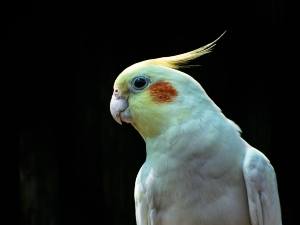
Cockatiels are very pretty birds whose feathers are mainly yellow, some birds will have the occasional white or light brown on their feathers but a sudden change in your bird’s feathers will be concerning
This article is a look into why there are black spots on your cockatiels feathers.
Table of Contents
Black spots on cockatiel feathers:
While it is true that the appearance of birds may change over time, a sudden dramatic change, like black spots developing on your bird’s feathers, is concerning.
Here is why your pet cockatiel may have developed some black spots on its feathers.
Wear and tear:
If your bird has been living with the same set of feathers for a while, then the feathers have likely experienced some wear and tear.
This wear and tear can make the ends of your bird’s feathers very dark and even black.
The feathers may have been over-preened by your bird, damaged by your bird’s toys, or, the bird may have barbed its own feathers (chewed on the ends of the feathers) all of this could have caused the ends of the feathers to turn black.
What to do:
If the feathers have been damaged then you can’t revive them, what is done is done.
You as the bird owner can’t do anything to revive the bird’s feathers but don’t worry, the feathers will molt off eventually and a new set of feathers will grow. Birds molt once or twice a year so be patient.
Nutrient deficiency:
Food is very important if you want your bird to be happy and healthy, nutrients in food, namely vitamin A, can greatly affect how your bird looks.
Vitamin A deficiencies are common in birds in captivity, a vitamin A deficiency is also one of the reasons why your bird’s feathers may start to turn black.
What to do:
Fixing this problem is as simple as getting vitamin A into your bird’s body, this can be done by giving your bird vitamin A rich foods or giving your bird vitamin A supplements.
Foods that are rich in vitamin A include kale, spinach, red pepper, apricots, carrots, sweet potato, and mangoes
Fungal infection:
If parts of your bird’s feathers develop black deposits then the black deposits on your bird’s feathers may be a fungal infection.
This is common in domestic birds because people are always touching the bird and thus transferring the oils from their fingers onto the bird.
Fungal infections thrive on these oily feathers.
What to do:
If the bird does have a fungal infection then taking your bird to the vet is recommended.
The vet will remove the feathers that are badly infected by plucking them off. The vet will do this while the bird is under anesthetic.
After this, the vet will spray the rest of the bird’s feathers with a disinfectant solution.
This solution will need to be sprayed for a while until the new feathers grow in. Don’t try to remove the feathers yourself as plucking without anesthetic will be painful for the bird.
Ensure that the bird can bathe as often as it needs to as soon as it comes back from the vet.
If you enjoyed this article then you may also be interested in other bird related articles. Here are some articles that you may be interested in: Budgie Cere Hypertrophy, Budgie Cere Overgrowth, Why Is My Budgie’s Beak Dry?, How To Tell If Birds Are Bonded To Each Other, How To Know If A Parrot Is Angry, Why Are My Bird’s Feathers Turning Grey?, Cockatiel Growth On Side Of Beak, Black Feather Fungus, Conure Feathers Turning Black

